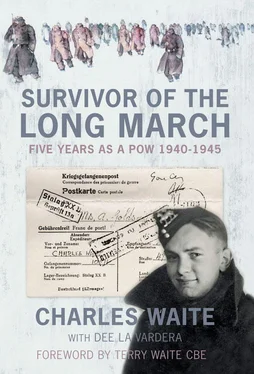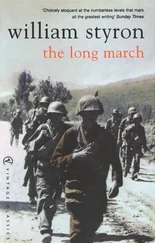We all smoked, of course. What else was there to do to relax after a long day out working? But cigarettes were also useful for bartering with the guards for extra food, and occasionally with villagers. It had to be somebody you could trust and you were always careful not to let anybody see you do it. You would give the person twenty ciggies and he would see you got an extra loaf from the village. As they took the cigarettes first, you had to trust that they would come up with the goods. Of course, they could get into serious trouble if the authorities found them fraternising with prisoners so they kept their side of the deal.
When the food was gone, we kept the packaging to use again. We were all good at saving odds and ends for a rainy day. Cardboard boxes were good for storage or could be cut up and used for insulating your clothes and boots. String was useful for hanging up clothes to dry or came in handy at harvest time to tie round your trouser bottoms to keep mice from running up your legs in the hay barn. Empty tins and lids could be bashed out to make tools and containers. A tin of KLIM, the Canadian dried milk (the word Milk spelt backwards) made a good jug, thanks to Heb who got himself a job at the local smithy.
That came about one morning when the Unteroffizier asked us at roll call if anybody had worked in a blacksmith’s. Heb put his hand up straightaway and said, ‘ Ja .’ Of course, he’d never been near a smithy in his life but they weren’t to know that. You had to use your wits in this place and look for any opportunity that could be turned to your advantage. The local blacksmith needed help because his son had been called up so Heb was taken down there and shown what to do. He was a quick learner and must have been quite good at it because he continued to work there on and off for quite a long time.
At lunchtime the blacksmith went back home for his meal, leaving Heb on his own in the workshop to have the bread and soup which was brought out from the house. He used the time to make things like nails, hooks and kitchen utensils for us depending on what scraps of metal were available. He was treated well there and was always busy with one job or the other for the locals as well as helping us back at camp.
One of our favourite treats from the Red Cross parcels was Rowntree’s jelly, which came in cubes. If we got enough packets to make it worthwhile heating up some water and using our precious wood, we made one big one. When we opened our parcels and looked through the contents the shout, ‘Jelly!’ went up. Once we had three packets, two orange and a lemon, and for some reason my pals gave me the job of making it. It took ages for the water to boil on the wood burning stove as we kept feeding bits of twigs in to keep the fire going. I managed to get enough hot water to melt the jelly. It was winter and the snow was about 18” deep so I thought that it would set nicely outside in my tin bowl.
All the cubes melted and a lovely fruity aroma arose from the bowl as I kept stirring. I carried the hot liquid outside, walking carefully so as not to spill any on the way. I balanced it on a pile of snow outside and then went back in to get warm again. We all forgot about it until Laurie said, ‘Chas, when did you last check the jelly?’ So off I went back outside only to find that the bowl had turned upside down and there was nothing there. The snow had melted and the bowl had tipped over and all our lovely liquid jelly had disappeared into the ground. Pity I didn’t do any science at school or I might have thought of placing the bowl on a piece of wood, even a stone or brick, a surface which didn’t conduct heat. Terrible waste of jelly, hot water and fuel! It was a long while before we got any packets of jelly again in our parcels. And when we eventually did it wasn’t me asked to make it.
Gradually over time, we received more parcels and some of these came through from home. I wrote to my mother asking for new socks and underwear and a few months later they were delivered. Lily sent me a knitted scarf for my birthday once. It was amazing to think that items like these, requested by thousands of men like me, were able to get across war-torn Europe to us. Fantastic!
My brother-in-law, who was a fireman, sent me one of his jumpers. It was dark blue, in a sort of shiny material which was very warm. Unfortunately, it had a ribbed neck and bottom seam which caused a lot of discomfort to me, not just in the camp but especially on the Long March. Lice like nothing better than a warm, cosy place to settle down and start a family, and seams in clothes are ideal for that. It is, however, almost impossible to find and remove eggs from there. Some people used a lighted match and ran it along a seam to burn them off but it wasn’t always successful. Better to be warm and lousy, I believe, than die of cold.
Like all the other men, in all the POW camps everywhere, I treasured every single present I received. I didn’t like asking for things from my family. Even though they weren’t luxuries or treats but essentials, I always felt bad about my mother having to send stuff out to me. I was worried all the time. I didn’t know what she and other members of the family were really going through. Letters were always cheerful and didn’t tell me what was really happening at home. Was the family safe? Was the shop doing OK? How were they managing for money? I felt useless. Lily had a career of her own now because she knew that I might not come back. Not that she said that exactly in her letters but joining the ATS got her away from her family and helped her become financially independent. If only I had some proper money I could send home.
Who needs money when you’re stuck in the back of beyond with nothing to spend it on? What would be the point of paying wages for the work we did? So why would they give us this paper money which could only used in a POW camp? It might be OK for fellows in the big camps who could buy razor blades and soap but there was nothing here. You could gamble with it, use it to roll your own cigarettes or it might come in handy to wipe your bottom if you were caught short somewhere. Cigarettes were our main currency.
The German government introduced a system of payment to prisoners of war for the work they did in the labour camps. It was called Kriegsgefangenen Lagergeld – prisoner of war camp money, and they paid ‘wages’ with these little tiny notes like doll’s house money – about the size of a cigarette card. This currency was only valid within a POW camp so it was pretty useless. What’s the point of winning a game of Rummy or Sevens and having a handful of these Reichspfennigs at the end of a game?
One day some of us were playing cards and Heb was doing well, collecting notes from us each time he won a hand. A guard came into the room to see what we were doing as he heard all this cheering (and booing) after another of his wins. This particular guard was a decent sort of chap, one of those you could talk to: us with our pidgin German and him with his hand signals. He watched us playing for a moment before coming over. I think he had his eye on Hebby’s winnings on the table and asked us what we were going to do with the money.
‘Nichts,’ – nothing, we said, ‘ Nichts zu kaufen,’ – nothing to buy.
‘ Magst du Musik?’ – do you like music? The guard started to mime playing the piano.
‘ Ja, ja, ’ we said, wondering why he’d asked. And Jack, who was very musical and could play the piano, came forward and repeated, ‘ Ja. Ja. Musik, ’ running his fingers up and down an imaginary keyboard. ‘ Ich liebe Musik, ’ – I love music. ‘The piano. Das piano? ’
‘ Ach ja. Das Klavier, ’ – oh yes, the piano, the guard corrected. ‘ Schön ,’ – lovely, he said.
Читать дальше




![Джеффри Арчер - The Short, the Long and the Tall [С иллюстрациями]](/books/388600/dzheffri-archer-the-short-the-long-and-the-tall-s-thumb.webp)







